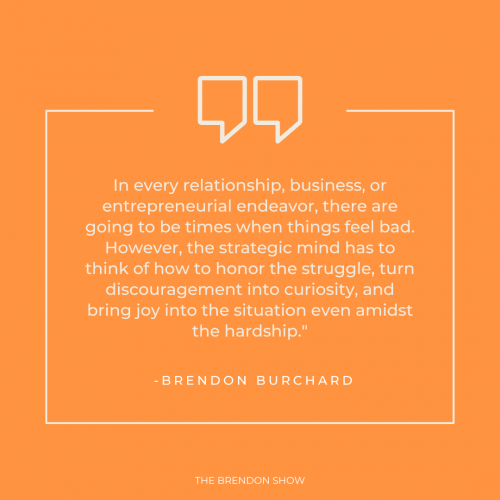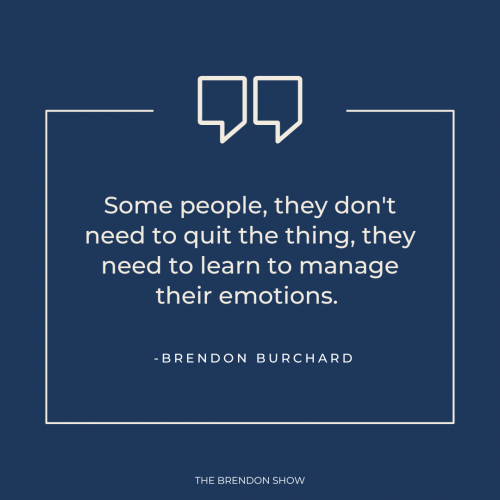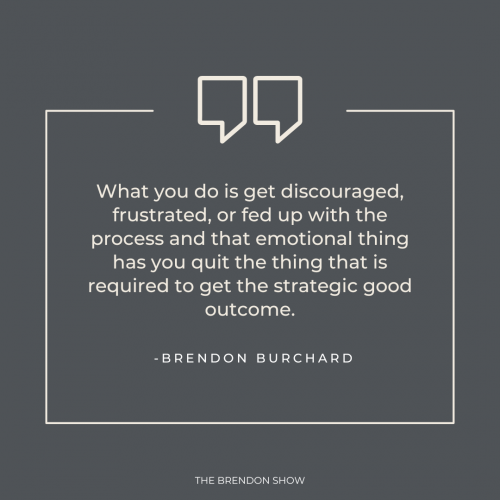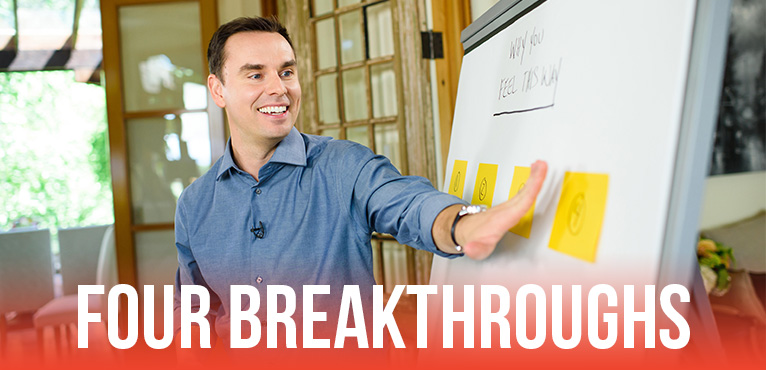SUMMARY
- “Some people, they don’t need to quit the thing, they need to learn to manage their emotions.”
- Perseverance is often a key to success — but sometimes, it’s important to quit the wrong thing so you can clear out space for the right thing. In this episode, discover how to know when to quit and when to persevere.
- “In every relationship, business, or entrepreneurial endeavor, there’s going to be times when things feel bad. However, the strategic mind has to think of how to honor the struggle, turn discouragement into curiosity, and bring joy into the situation even amidst the hardship.”
- As we navigate the unprecedented “Great Resignation”, it’s key to determine when it’s time to quit a pursuit or learn how to emotionally journey towards the desired end result. Watch this epsiode as Brendon makes determining when to quit an easy process!
- Watch the video to get the full training.
- Already have the High Performance Planner and CRUSHING each and every day? Let’s celebrate you! Take a photo with your planner and use #GrowthDay so we can find you on social media!
HOT NEWS & DEALS!
-
Get the Confidence Masterclass
Stop letting limiting beliefs and lack of confidence hold you back! Learn the SKILLS of confidence from 9 of the world’s best personal development experts in the most comprehensive Confidence training ever created! $400 worth of training – just $7.99 today! Get the Confidence Masterclass!
-
Get the GrowthDay app!
Make self-improvement a way of life and get the GrowthDay app! GrowthDay features all your personal development tools, coaching and community in one place. Write your journal, track your habits, take wellness challenges, watch live influencers teaching new life strategies, and join a global community of positive and supportive high achievers excited to improve their lives! Get the app on Apple app store here. Get on Android here. Get desktop here.
DID YOU KNOW?
I give weekly prizes, gratitude and shout-outs to our students, so post a screenshot or video on Instagram and use #TheBrendonShow! I can’t wait to hear your thoughts about this episode!



FULL TRANSCRIPT
[The following is the full transcript of this episode of The Brendon Show. Please note that this episode, like all TBS episodes, features Brendon speaking extemporaneously–he is unscripted and unedited. Filmed in one take, The Brendon Show has become one of the most viewed unscripted, direct-to-camera self-help series in the history of YouTube. It has also been the #1 Podcast in all of iTunes and is regularly in the top podcasts in the Self-Help and Health categories around the globe. Subscribe to the free motivational podcast on iTunes or Stitcher.)
1. Manage Your Emotions
The very first question that I might ask when someone tells me they want to quit something is I’m going to ask this question. “Is this decision you’re about to make, strategy or discouragement?” Meaning, are you thinking about quitting the thing because strategically you’ve thought through it and it’s the right next, bold, move for you, your family, your career, and your future? Or do you just feel discouraged? Right. Is it a logical thing, like you’ve sequentially thought this decision out or do you just feel bad right now? Are you just discouraged because you’ve tried for a while and it’s not turning out? Are you discouraged because you got some negative feedback? Are you discouraged because you got some rejection? Are you discouraged because you’re disempowered in that relationship or that job or that career? And a place of discouragement is not the same as empowerment. And we have to be aware of that. But what I want to know at the very beginning of the conversation is just where are we? Have you been thinking through this? This is the strategic right move for you and your family, your life, and your career or are we just kind of in a fed-up place, a hurt place, a discouraged place?
Because some people, don’t need to quit the thing, they need to learn to manage their emotions.
That’s a very different thing because many people, they’re in the right thing, but they’re lacking that emotional connection or emotional intelligence to deal with the realities of it. I’ll give an example.
2. Honor the Struggle
I don’t know who’s ever had a hard job before. Like it was hard and you were failing and you sucked. Or maybe you started your own business and the first year, I mean, it was terrible. You felt like a failure the whole time. People are like, Why are you doing that? Spending your time there, the neighbors making fun of you, talking behind your back, and you’re like trying to get it going, and you’re putting so much into it and it’s not happening. It’s discouraging. And yeah, I better. I’ll quit this opportunity. I’m not going to quit this effort. I’m going to quit my dream. Well, the reality is there, maybe the dream was strategically the right decision. The opportunity was strategically a good bet. But what happened was you got emotionally hooked in your feelings of how you’re dealing with that difficulty, made you make a decision to throw out the thing when really, if it was the right thing, you needed to learn to manage your emotions better.
In every relationship, there’s going to be a time when it feels bad, in every new startup, every new entrepreneurial idea, and every company. There will be times when it just feels bad. That’s life. The strategic mind has to say, okay, even though this feels bad if I’m in the right place, can I learn to honor the struggle? Can I learn to turn that discouragement into curiosity or even interest? Can I learn to take that disempowering feeling and find a way to bring joy into this thing that right now kind of sucks? You know, I remember, and this applies at the most simplistic levels in our lives. It really does. How discouragement allows us to quit things. I’ll give an example.
3. Don’t Quit Because of the Small Things
Have any of you ever applied for a mortgage? Has anyone ever gone through this? How about any entrepreneur? Have you? If you’re an entrepreneur and you’ve applied for a mortgage, that is a particular kind of hell. You know that is that they don’t believe in you. They don’t trust your income. You might earn more than your neighbor, they don’t believe you. Like it’s, it’s an awful process. I’ve been through it multiple times in my life. And every time I’m like, after the fifth call or the millionth request of a document that’s stupid I get discouraged. I get angry, I get fed up with that. I go, I’m out. Well, it’s right for me to keep trying to get that mortgage for us to get the house. That’s a strategic right decision. We chose the city. We chose the house. But I get discouraged in the process and I’m like, “Screw this” and I want to quit. And Denise, my wife, she’s always like, “It’s just paperwork. We’ll get through it. Let me help you with that or let’s do this.” And she’ll save the day. Because for me, paperwork is a lot of pain. So you see how that so small thing has been an example? Such a small, simple thing. You quit things that are just paperwork things to get you toward your dreams. Think about that. Think about how many times you’ve just thought, I don’t want to fill out this loan application. I don’t have to reach out to them.
What you do is get discouraged, frustrated, or fed up with the process and that emotional thing have you quit the thing that is required to get the strategic good outcome.
And as soon as you realize that, like, whoa, I’m just giving up. I’m giving up on the right thing because I feel the wrong way.
4. Be Strategic, Not Impulsive
You really got to get your head around this one. Like this is a major decision, right, in your life? You want to be thoughtful and strategic and intentional about it, not impulsive or acting from discouragement. Now I know therapists on the line are like “Brendon. Oh my God, you’re such a terrible coach. Don’t you realize that people should listen to that discouragement?” I’m like, Oh, yeah, absolutely. I just don’t want you to live there or make all your decisions from that place. You can listen to discouragement. You can feel fed up. Notice I’m not taking away the emotion. And in fact, the whole goal here is where are we coming from? When people first propose quitting a marriage, a relationship, a job, or an opportunity, their first proposal of this is stupid, I’m going to quit is impulsive, not strategic. And I, again, as a coach, when they first throw it at me, I want to know where they’re at.


